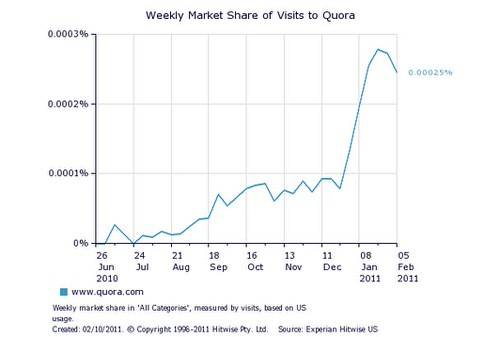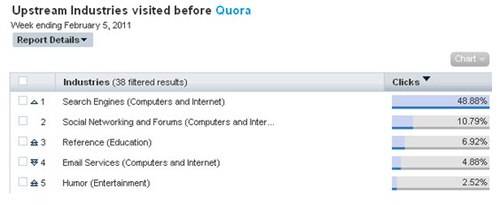
Question and answer site Quora gets talked about a whole lot in the tech press, for a variety of reasons, but are everyday people using the site? Traffic analysts Hitwise ran some numbers today and put up a blog post showing that the service is gaining momentum quickly, thanks to search engines, college-educated professionals and students.

Hitwise says that repeated citations and coverage from publications like TechCrunch and CNet have driven much of the site’s visibility, but 49% of its traffic is coming from search engines, Hitwise says. A graph of traffic sources is below.

Very Strong Statements About Quora’s Future
“Quora may well become a top-10 most valuable web business.” –Max Levchin, former CTO of PayPal
“Quora will be the most important (and valuable) Internet company created after 2006.” –Keith Rabois
“… Quora will be one of the foundational default companies of the next decade.” –Shervin Pishevar, serial entrepreneur and investor
Though Question and Answer is an old category, Quora has gained fans quickly because of its quality design, real-time interface, verified user identities, all-star founders (CEO Adam D’Angelo was Mark Zuckerberg’s childhood friend and Facebook’s first CTO), careful community curation and the candid participation of Silicon Valley elite. If half the site’s traffic is now coming in from search engines, though, it sounds like Quora might be finding success outside the usual suspects going there to learn about tech industry insider opinion.
The site is a lot of fun to use and if you’re looking for a combination of serendipity and education, Quora is a good place to go.
Update: We asked Hitwise for specific traffic estimates. Their answer is a whole lot less pretty than the jumping chart on top of this post. “They had about 191,000 total visits in January 2011,” Hitwise’s Matt Tatham told us. “The hype is ahead of the traffic growth right now but the latter is catching up quickly,” he said.
Just for the record, when you hear talk about how Quora is a darling of the tech press – remember that it was ReadWriteWeb that ran the first screenshots of the site and that reported the first news story based on a Quora conversation. Ashton Kutcher answered my question “When is the first Twitter developer conference going to be held?” and we were the first to report the unannounced date. Tech press now trolls Quora like it was Twitter in 2008.
It’s not just for fun and education, though. Quora believes that its combination of topical streams, community voting and verified identities can be used to build an index of information and reputations based on proven and vetted knowledge. That reputational information could be taken elsewhere on the web and used like a credit score for topic knowledge. That would be a very valuable service for Quora to be able to provide.
While Quora and its fans make a lot of noise about that kind of offering the service could make in the future, competitor StackOverflow is already much, much bigger and has begun to offer employment credential type information for participants on its developer forum.
Time will tell where Quora takes the data it’s collecting, but you can be sure that data tied to people and to structured topics is going to be a big market in the future.
















